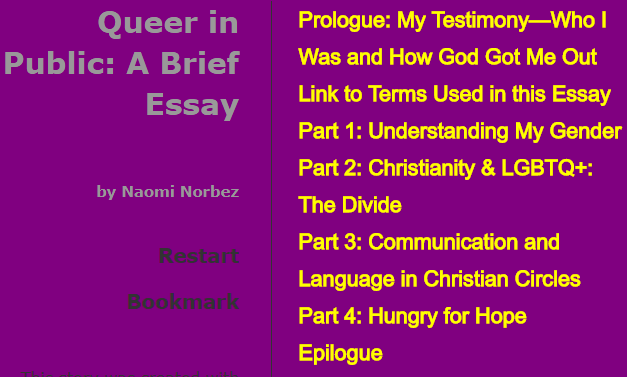By Naomi Norbez. Read on iPhone.
This is subtitled “A hypertext essay about the Christian & LGBT community”.
Entering a non-fiction essay into a fiction competition was probably not a good idea. Entering something with writing clearly targeted at Christians into a general international competition also will not have desired results. (The essay is pretty readable even for non-Christians, but there are some references that will likely be confusing. Just be warned the direct address at Christians also brings a vague undercurrent of proselytizing, even if it’s unintentional.)
I have enough religious studies chops I’ll go ahead and review this like it was an essay in an essay contest for Christians, although I’ll mention to the author to please don’t be surprised at potential low ratings and/or puzzled reviews.

Also, I’m probably not qualified to review an essay anyway; I’ve never done it before. To simplify matters, let me focus on: Would it be convincing for the target audience — Christians who are skeptical of modern gender/sex issues?
The essay begins with the author’s childhood descent into pathological lying, followed by finding God. How I Became a Christian is a common narrative to start with, because it builds empathy. The writing throughout is clear and never condescending. The basic point is phrased in a way that should resonate:
Fellow Christians, let that sink in: The church is starving people of God’s truth because of its discomfort. It’s no surprise people leave the church because of this. No one wants to be starving of hope. If the church won’t give them answers, they’ll find them somewhere else.
There’s also a basic point about “holy” just meaning “set aside for special purpose” and how single-ness should be considered just as fine as being married, although I feel like something got muddled here by seeming to imply all non-binary people will not get married. (I must have read that wrong, but if you imagine the reader from the perspective of doing everything possible to stick with their original beliefs, there’s too much of an “out” here to just assume trans and gay people will be celibate.)
I don’t think it quite does enough for skeptics in one important point: scripture citation. Most Christians that treat scripture loosely are already with the author’s side, so the audience here is really the ones who consider the Bible an unimpeachable holy book. The essay mentions biblical passages (Genesis 19, Leviticus 18:22, Leviticus 20:13, Romans 1:26-27, 1 Corinthians 6:9-10, and 1 Timothy 1:10) and hints at how people differ in interpretation, but never gets explicit, instead deferring to another writer. I think it’s safe to say your skeptics will not go out of their way to read a second essay on this sort of topic, so you should at least include a hook. Pick just one of the passages and go into detail like the other author does, enough to convey the impression that yes, things can be read differently, or least mention the hermeneutical question — that a law in the Bible does not necessarily apply to today, and there are many Old Testament laws that do not get followed even by strict biblical literalists.
Pingback: IFComp 2017: Salt, a partial list of things for which i am grateful, Run of the place | Renga in Blue
Pingback: IFComp 2017: Summary and Mini-Reviews | Renga in Blue